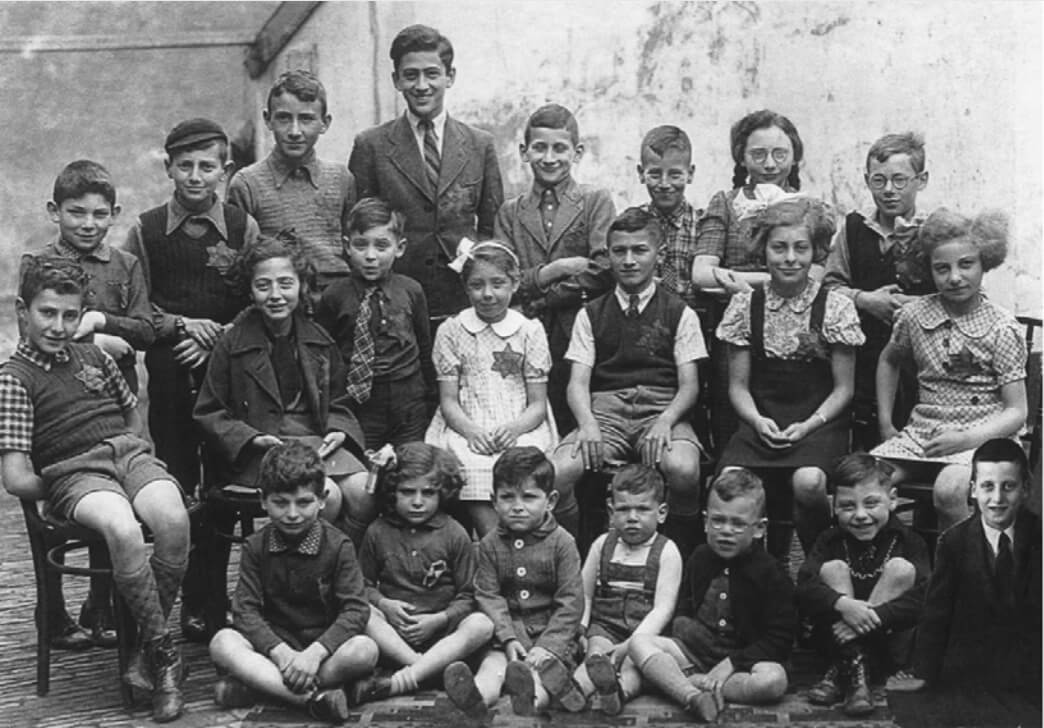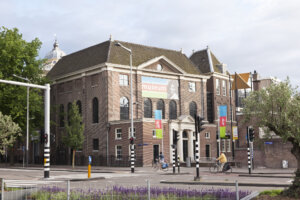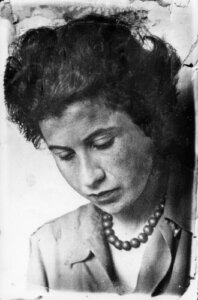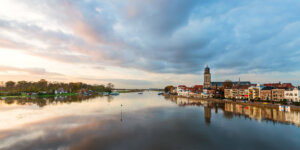The ‘grown-up Anne Frank’ remains little known — and there’s a reason for that
Etty Hillesum, who died in Auschwitz in 1943, wrote frankly about her inner life and her love affairs

Graphic by Angelie Zaslavsky
On a winding medieval street in the small Dutch city of Deventer, a quote is stenciled across a white stucco wall. “Boven die straat staat toch de héle hemel,” it says. “Above this street stands the whole sky.”
The words are taken from the diary of Etty Hillesum, scribbled before she perished at Auschwitz in 1943. “Even if one narrow street remains for us through which we may go,” she wrote, “the whole sky is above that street.”
Deventer, located 40 miles from the German border, might be the most obscure port in the old Hanseatic trading league, despite its immaculate Golden Age architecture and ancient ramparts. Locally, it’s better known for its dense honey cake, sold at a bakery in the town square, and for the turreted Great Synagogue that served hundreds of Jewish families before the war. For the 15 years they lived here, these included the Hillesums. Esther, or “Etty,” went to the Jewish school located behind that white stucco wall, now called the Etty Hillesum Center.
I ended up here by chance last summer, and in stumbling past the center discovered the diarist some consider to be “the grown-up Anne Frank.” As if I’d found a new word you learn, then suddenly start spotting everywhere, I began noticing Etty’s name all over Holland. In September, the author Judith Koelemeijer released her lauded biography on Etty’s interrupted life. And in October, the Jewish Museum in Amsterdam launched Etty & Leonie, a showcase of Etty’s diaries and letters alongside those of her frenemy Leonie Snatager, who survived the war in hiding and spent her later life in the U.S.

Etty began writing in earnest after leaving school and settling in Amsterdam. Yet Deventer, where she began her intellectual life, is worth a visit. The Hillesums lived in an elegant house at 9 Geert Grootestraat, a lane of herringbone brick near the star-shaped moat that circles the town. As deputy headmaster of Etty’s school, her father taught classical languages; her mother, a Russian émigré, educated the children in her culture and language. A monument to the family, shaped like a shard of broken glass, was unveiled recently on the IJssel River footpath.
On every second Sunday, the Etty Hillesum Center leads a group walk around Deventer’s erstwhile Jewish quarter, past homes that once belonged to Cohens and Gosschalks, and brass “stumbling stones” set into the pavement outside the homes of deportees. Inside the center are sepia keepsakes from Etty’s era — including a haunting school photo of 22 smiling children, their mandatory yellow stars sewn to their fine clothing. Rotating exhibitions promote tolerance and responsibility, as set out by Etty in her diaries: “One must accept one’s circumstances, good and bad, but that does not prevent one from devoting one’s life to improving the bad.”
In the mid-1930s, Etty moved to Amsterdam to study law in the same monumental buildings that now house luxury hotels. She earned money translating Dostoyevsky, and keeping house for a 62-year-old widower named Hans Wegerif in the relative luxury of the Museumplein. She fell in with anti-fascists, devoured writers like Rilke, and dabbled in Buddhism. After she and Wegerif became lovers — they lived what she called “an almost married life” — she developed the sort of brooding angst familiar to women her age, whatever era.

To nurture her “inner life,” she began a course of therapy with psychologist Julius Spier, a disciple of Jung and master “chirologist,” or palm-reader. Spier recommended therapeutic diary-keeping (and a rather dubious wrestling ritual) to his young female clients, but gave special attention to Etty. She penned her first diary entry in early 1941, a year before Anne Frank began hers. It began modestly: “I dare not open up and freely give vent to my feelings, and yet it shall have to be if I wish ultimately to make something of my life,” she wrote. “I am quite refined and, I daresay, expert enough to be counted among the good lovers, but love is only a game that eludes what is really important and something deep inside me remains locked up.”
Before long she added Spier — “the accoucheur of her soul” — to her roster of lovers and opened up on the page. “I don’t think I am cut out for one man,” she wrote. “Nor could I ever be faithful to one man. Not because of other men, but because I myself am made up of so many people … Is that sordid? Is it decadent? To me it feels perfectly all right.”
Etty Hillesum is far from unknown – her diaries have been translated into 30 languages. But something about her maturity, her secularity, her sexuality, her lack of preoccupation with the horrors of war, has kept her from the level of posthumous fame Anne Frank has enjoyed.
“Anne impressed so many people because she was so young and already such a good writer,” said Ariane Zwiers, curator of Etty & Leonie at Amsterdam’s Jewish Museum. “Etty was not a young girl – also a good writer, but she had a philosophical way of writing.”
Religion was less of a concern of Etty’s than, say, Rilke, Zwiers aded. And it’s no surprise that while Frank’s diaries were printed in 1947, the woman who wrote “I have broken my body like bread and shared it out among men” wasn’t published until 1981.
But Zwiers also reckoned that the world wasn’t ready for an introspective female-driven autobiography.
“She lived on Museumplein, near the German consulate, with demonstrations happening, Nazis walking around,” said Zwiers. “That must have made an impression on her.
“What I find special is that in spite of these facts she can write about friendships, beautiful flowers, and many other things, as if the war isn’t everything.”

Zwiers’ exhibition places the diaries of Etty and Leonie side by side, along with correspondence unearthed by Leonie’s son after her death in 2013, and seen here for the first time. In their letters, the women argue over Spier, discuss their philosophical differences and gradually drift. They both volunteered for the Jewish Council, but Etty promptly left for a job supporting deportees at Westerbork transit camp, north of Deventer. She chose solidarity, to “share her people’s fate.”
It was, as they say, the beginning of the end. Spier died from cancer in September 1942. Leonie, to Etty’s dismay, went into hiding.
“Leonie had no guilt about it,” said Zwiers. “She was glad not to have followed Etty. After the war, she said it was the right thing to do. Etty had many possibilities to go into hiding but didn’t want to.”
Etty was under no illusions about what lay ahead, yet remained sanguine. Aside from turning her, unwittingly, into an author, written therapy clearly helped her emotional state. “The misery here is quite terrible,” she wrote of Westerbork, “and yet, late at night when the day has slunk away into the depths behind me, I often walk with a spring in my step along the barbed wire. And then time and again, it soars straight from my heart — the feeling that life is glorious and magnificent, and that one day we shall be building a whole new world.”
She remained positive until the end. In summer 1943, the Hillesums were summoned to Westerbork and Etty was forced onto their train to Auschwitz. Before boarding, she passed her notebooks to a friend, who set off the chain of events leading to their publication. Etty died on Nov. 30, just shy of 30. On a final postcard, found by a farmer and dropped in the mail, she wrote, “We left the camp singing.”
Etty and Leonie runs through April 23 at the Jewish Museum in Amsterdam.




















